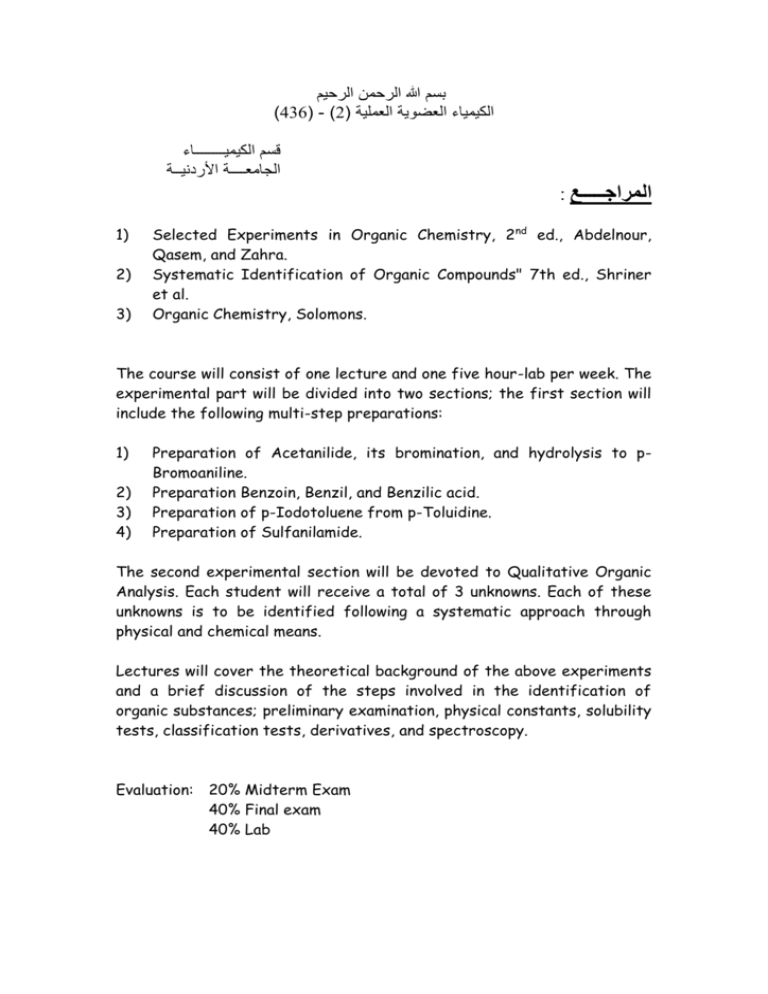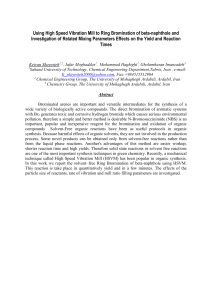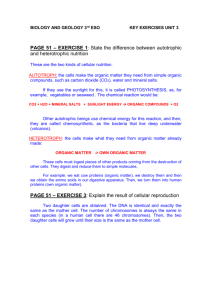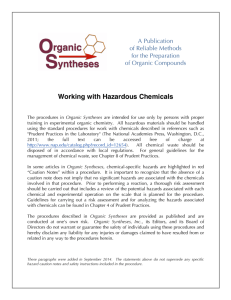بسم الله الرحمن الرحيم
advertisement

بسم هللا الرحمن الرحيم )436( - )2( الكيمياء العضوية العملية قسم الكيميــــــــاء الجامعــــة األردنيــة : المراجـــــع 1) 2) 3) Selected Experiments in Organic Chemistry, 2nd ed., Abdelnour, Qasem, and Zahra. Systematic Identification of Organic Compounds" 7th ed., Shriner et al. Organic Chemistry, Solomons. The course will consist of one lecture and one five hour-lab per week. The experimental part will be divided into two sections; the first section will include the following multi-step preparations: 1) 2) 3) 4) Preparation of Acetanilide, its bromination, and hydrolysis to pBromoaniline. Preparation Benzoin, Benzil, and Benzilic acid. Preparation of p-Iodotoluene from p-Toluidine. Preparation of Sulfanilamide. The second experimental section will be devoted to Qualitative Organic Analysis. Each student will receive a total of 3 unknowns. Each of these unknowns is to be identified following a systematic approach through physical and chemical means. Lectures will cover the theoretical background of the above experiments and a brief discussion of the steps involved in the identification of organic substances; preliminary examination, physical constants, solubility tests, classification tests, derivatives, and spectroscopy. Evaluation: 20% Midterm Exam 40% Final exam 40% Lab 1 University of Jordan Organic Laboratory Report Department of Chemistry Chem. 336 _________________________________________________________ Name: ........................................................... Unknown No.: .............................................. _________________________________________________________ 1. Physical Examination : a) Physical State: ............................................................................. b) Color : ......................................................................................... c) Odor: ........................................................................................... d) Ignition test: ................................................................................. ..................................................................................................... ..................................................................................................... 2. Physical Constants: a) Melting point: .............................................................................. b) Boiling point : .............................................................................. c) Specific gravity : .......................................................................... d) Refractive Index (nD) .................................................................. 3. Elementary Analysis : a) Halogens : .................................................................................... ..................................................................................................... b) Nitrogen : ..................................................................................... c) Sulfur : ......................................................................................... d) Metals : ........................................................................................ 4. Solubility Tests H2O Et2O NaOH 5% NaHCO3 5% HCl 5% H2SO4 conc. Reaction to litmus .............................................................................. Reaction to phenolphthalein .............................................................. 2 5. Classification tests Reagent Results Inferences Functional group indicated by these tests .......................................... ........................................................................................................... Results of special tests (N.E, S.E, etc.) .............................................. ........................................................................................................... ........................................................................................................... Comments : Approved by: ....................... 3 6. Examination (Searching) of literature: Possible Compounds 7. Lit . Mp on Bp Derivatives and Physical Constants Eurther Classification and Special Tests : a) ..................................................................................................... b) ..................................................................................................... c) ..................................................................................................... d) ..................................................................................................... 8. IR data : ............................................................................................................... ............................................................................................................... ............................................................................................................... ............................................................................................... Comments : Approved by : ...................... 4 9. Preparation of Derivatives: Name of Derivative Observed Mp . 10. NMR Spectrum of the unknown if needed. 11. Name and structure of unknown . Reported (Lit.)Mp 5 بسم هللا الرحمن الرحيم )Chem. 336( 2- خطة تدريس مساق الكيمياء العضوية العملية 98/97 الفصل األول " Systematic identification of organic compounds " :المرجع الرئيسي Shriner, et.al., 6th edition. 1." Organic Structure Determination " :مراجع أخرى Pasto and Johnson. 2." Organic Functional Group Analysis", Schenk. 3." Spectroscopic Methods in Organic Chemistry" Williams and Fleming. I. Experimental Section: Experiment Lab periods ______________________________________________________ 1. Preparation of p-bromoaniline 1 2. Benzoin, benzil, and benzilic acid 1 3. Canizzaro reaction 1 4. preparation of sulfanilamide 1 5. Preparation of p-iodotoluene 1 6. Identification of unknowns 9 ______________________________________________________ II. Theoretical Section: Topic Lectures ______________________________________________________ 1. UV, IR, Mass, and NMR spectroscopy 6 2. Physical properties and physical contants 4 3. Aldehydes and Ketones 2 4. Alcohols and phenols 3 5. Amines and Amino acids 3 6. Amides, nitriles, esters, acids 4 7. Alkenes, alkynes and aromatics 3 8. Ethers, halides and nitro compounds 3 ______________________________________________________ 6 Chem. 336 Lab. Report Name: ............................................................. Date: ..../..../199 _________________________________________________________ Cannizzaro Reaction Equations : Yield ; Theoretical : Actual : % Yield : Questions : 1) What are the limitations of this reaction, explain ? 2) Give an equation for a crossed cannizzaro reaction, give a mechanism, and explain why does it follow such a path ? 7 8 Chem. 336 : االســـــــــــــــــــــــــــــــــــــــــــــــــــــــــــــــــــــــــــــــــــــــــــــــــــــــــــــم …………………………………… .……………… :الرقم الجامعـي _________________________________________________________ Preparation p-Bromoaniline Equations : Weight of product: Theoretical Yied: % Yield: MP = - Why is bromoaniline not obtainable by direct bromination of aniline? And what is the reason of acetylation? - The -NHCOCH3 is ortho/para directing. Explain why (by drawing resonance structures of the intermediate for p-substitution). 9 -2- Why does bromination of acetanilide occur solely at the paraposition so that no ortho- isomer is obtained? - What is the method used for the purification of p-bromoaniline in today’s experiment? - Give an equation to show how aniline is obtained from benzene? 10 2) Give an equation for a crossed cannizzaro reaction, give a mechanism, and explain why does it follow such a path ?






